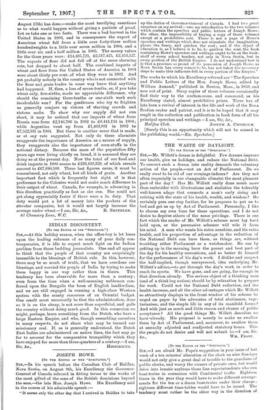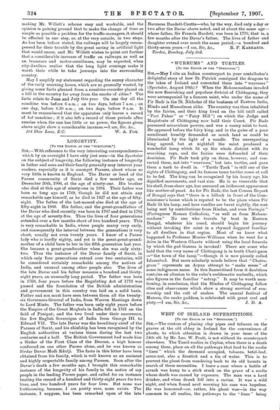LTO THE EDITOR OF THE "SPECTATOR:1 SIR,—I am afraid Mr.
Pope's suggestion in your issue of last week of a ten minutes' alteration of the clock on nine Sundays would not only give a great deal of trouble to the guardians of public clocks, and worry the owners of private ones, but would drive into lunatic asylums those line superintendents who run boat-trains in connexion with Continental traffic. Eighteen times in the year they would have to make different arrange- ments for the ten or a dozen boat-trains under their charge ; eighteen different time-tables would have to be issued. The tendency must rather be the other way in the direction of making Mr. Willett's scheme easy and workable, and the opinion is gaining ground that to make the change of time as simple as possible a problem for the traffic-managers, it should be effected in one step, or, at the very outside, in two steps. As has been before stated, the railways will be largely recom- pensed for their trouble by the great saving in artificial light that would ensue, and Mr. Willett wishes to point out further that a considerable increase of traffic on railways, as well as on tramcars and motor-omnibuses, may be expected, when city-dwellers realise that the long light evenings make it worth their while to take journeys into the surrounding country.
May I amplify my statement regarding the sunny character of the early morning hours, which are so generally wasted, by giving some facts gleaned from a sunshine-recorder placed on a hill in the country far away from the smoke of cities ? The facts relate to June and July this year. On one day all the sunshine was before 6 a.m. ; on two days, before 7 a.m.; on one day, before 8.30 a.m.; on two days, before 9 a.m. It must be remembered that the apparatus . only leaves a record of hot sunshine ; if it also left a record of those periods after sunrise when the sun has little or no power, the figures given above might show a considerable increase.—I am, Sir, &c.,







































 Previous page
Previous page